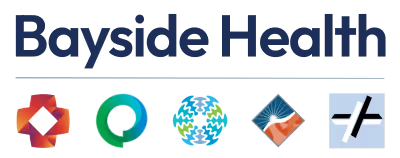Referrers Hub
MePACS has been keeping clients safe since 1989. We partner with service providers to offer a reliable solution to enhance the safety and independence of their clients and patients.
As a division of Bayside Health, a Victorian public healthcare service, we are trusted by healthcare professionals to deliver the highest level of care and expert emergency response.
As a division of Bayside Health, a Victorian public healthcare service, we are trusted by healthcare professionals to deliver the highest level of care and expert emergency response.

Personal alarm funding options
MePACS is an Approved Provider through the following programs:
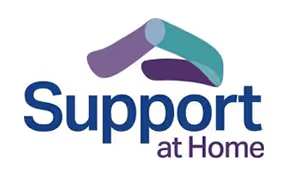



Why Choose US
We are here to help
Seamless client onboarding
We work directly with clients to make the onboarding process quick and easy.
We work directly with clients to make the onboarding process quick and easy.
Training and education
Our dedicated team is here to support you to refer clients with confidence and ease.
Our dedicated team is here to support you to refer clients with confidence and ease.
Duty of care
As part of the healthcare network, we prioritise client welfare—delivering person-centred care.
As part of the healthcare network, we prioritise client welfare—delivering person-centred care.
Special pricing for funded clients
To extend your client's funding further, we offer special pricing for Support at Home and NDIS clients.
To extend your client's funding further, we offer special pricing for Support at Home and NDIS clients.

personal alarms
Choosing the
right alarm
The right personal alarm can be one of the most effective and affordable solutions for managing the safety of older and at-risk persons living independently.
When recommending a personal alarm to a client, it's important to consider your client's specific needs, lifestyle and daily routine.
When recommending a personal alarm to a client, it's important to consider your client's specific needs, lifestyle and daily routine.
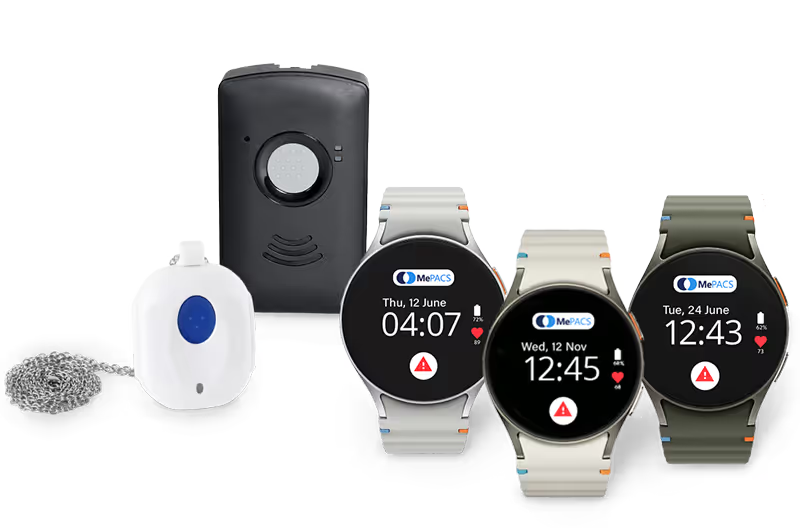
Key considerations
Client capabilities
The client must be able to safely and easily activate the alarm. Consider their physical and cognitive abilities, dexterity or any other impairment. Accessories can be purchased to assist users with activating the alarm.
Cellular coverage
MePACS alarms do not require a phone line, internet or NBN. Our devices operate on the 4G network. We check coverage for each client to ensure they have adequeate signal due to the compact size of the device.
Client lifestyle
The alarm should support the client's regular activities and lifestyle. Consider whether they will need a monitored alarm both at home and when out and about.
Falls risk
If your client is prone to falls, order the Home Alarm with a falls pendant and add the Mobile Alarm or Solo Connect for when they are away from home for fall detection.
Features & Benefits
The benefits of monitored alarms
Managing the welfare of older and at-risk persons living independently is a healthcare priority. Research has shown that MePACS monitored personal alarms are an effective solution: resulting in significant cost savings to the Australian healthcare system and improved health outcomes for patients.
Reducing unnecessary ambulance attendance & hospital admissions
Research has shown that MePACS emergency response service reduces unnecessary ambulance attendances by approximately 35%.
Improved falls management
Falls are a leading cause of injury, hospitalisation and death in Australia. A quick response has been proven to reduce the impact of a fall by preventing further injury or complications and improving physical and mental health outcomes.
Increased sense of security and confidence
Alarm users cite feeling safer and more confident living independently with the support of a monitored personal alarm.
Reliable rapid response
MePACS monitored alarms have a dedicated team of professionals ready to respond, even in the middle of the night. Auto-dial alarms rely on family and friends, who are not always available to respond.
Trained emergency monitors
MePACS emergency response operators are Bayside Health staff, based in Melbourne and trained in line with Triple Zero triage protocol. We do not outsource to third-party call centres.
Secure medical information
Relevant client health data is kept securely on file to assist with tailoring our response. When needed, it is provided to emergency services so they can prioritise the situation appropriately.
Request an HCP Quote
Whether you're seeking peace of mind at home or support for your workplace, MePACS is here to offer a tailored solution to meet your needs. Simply fill out the form, and we’ll provide a personalised quote based on the service that’s right for you
Thank you! Your submission has been received!
Oops! Something went wrong while submitting the form.
Request an NDIS Quote
Whether you're seeking peace of mind at home or support for your workplace, MePACS is here to offer a tailored solution to meet your needs. Simply fill out the form, and we’ll provide a personalised quote based on the service that’s right for you
Thank you! Your submission has been received!
Oops! Something went wrong while submitting the form.
Fill form to Refer a Client
Whether you're seeking peace of mind at home or support for your workplace, MePACS is here to offer a tailored solution to meet your needs. Simply fill out the form, and we’ll provide a personalised quote based on the service that’s right for you
Thank you! Your submission has been received!
Oops! Something went wrong while submitting the form.
Process
How to apply
We manage the entire application process to ensure a seamless and efficient experience for both you and your client.
Request a quote
If a prescription or quote is required for funding approval, this can be submitted online using our quick linked forms above.
Submit application form
Complete our Online Application Form. If you can’t submit an online form, please download our Funding Authorisation Form.
You can add any accessories that are not included on the form in the ‘Additional Information’ field.
You can add any accessories that are not included on the form in the ‘Additional Information’ field.
Order processing & account setup
Our sales team will contact the client to verify their details and nominated contacts. We will also conduct a brief assessment to understand their specific needs. This is part of our duty of care and helps us ensure they will be equipped with a suitable alarm.
We then set up the client profile and account, while our dispatch team coordinates delivery.
We then set up the client profile and account, while our dispatch team coordinates delivery.
Alarm installation & activation
The installation of the Home Alarm involves testing the signal strength at the client's home. There are two installation options:
Self-Install: Easy to do with step-by-step guidance from our technical team. Typically takes 15-20 minutes. We recommend having someone to assist if needed.
Tech Install: An approved technician will install the alarm at the home. Available in metro areas only for an additional cost.
The Mobile Alarm and Solo Connect are dispatched via post, with an easy activation process supported by our technical team.
The referrer will receive confirmation once the installation is complete.
Self-Install: Easy to do with step-by-step guidance from our technical team. Typically takes 15-20 minutes. We recommend having someone to assist if needed.
Tech Install: An approved technician will install the alarm at the home. Available in metro areas only for an additional cost.
The Mobile Alarm and Solo Connect are dispatched via post, with an easy activation process supported by our technical team.
The referrer will receive confirmation once the installation is complete.
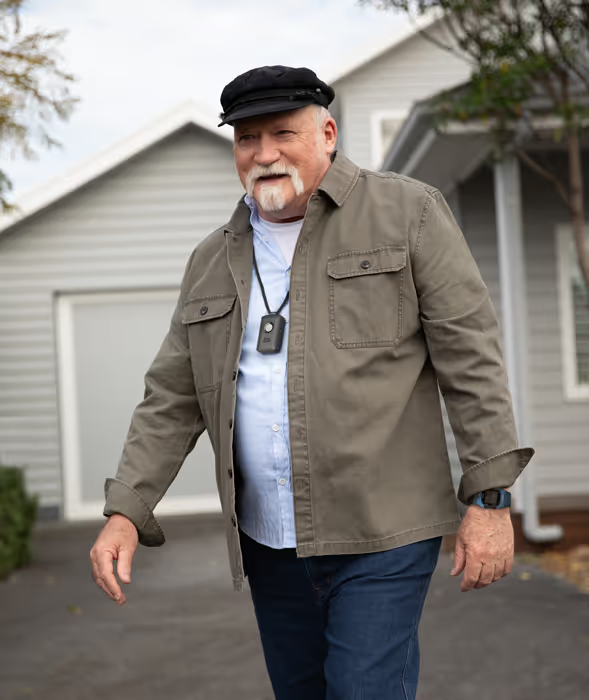
Upgrades
Adding a Mobile Alarm
For clients with a MePACS Home Alarm, the Mobile Alarm provides added safety and peace of mind while away from home.
Featuring falls detection, GPS, two-way voice communication, 4G connectivity and low battery alerts, this compact device provides peace of mind anywhere in Australia with good mobile coverage.
Featuring falls detection, GPS, two-way voice communication, 4G connectivity and low battery alerts, this compact device provides peace of mind anywhere in Australia with good mobile coverage.
Pricing (inc. GST)
Device
$385 + $29 Postage
Monitoring
$12 per month
Please note:
The monitoring cost is in addition to the monthly monitoring fee for the home alarm.
The monitoring cost is in addition to the monthly monitoring fee for the home alarm.
Mobile Alarm Add On Form
Cancellations
Service changes
To ensure safe and responsible cancellation of alarm services, we kindly request the following information:
- Client's full name
- Client’s address
- Client’s DOB
- Reason for the cancellation
- Does another person at the residence require the service (i.e. spouse)
We will confirm the cancellation with the client or one of their nominated contacts.
If your client is changing providers, cancellation is not required, please simply advise us who their new provider is and we will update the billing.
As part of the public healthcare network, MePACS is committed to upholding the Aged Care Act and delivering the highest standard of care — with honesty, integrity, compassion and respect. Therefore, where possible, please ensure any changes to your clients' services are made in consultation with them and with their knowledge and consent.
If your client is changing providers, cancellation is not required, please simply advise us who their new provider is and we will update the billing.
As part of the public healthcare network, MePACS is committed to upholding the Aged Care Act and delivering the highest standard of care — with honesty, integrity, compassion and respect. Therefore, where possible, please ensure any changes to your clients' services are made in consultation with them and with their knowledge and consent.
Submit Cancellation Request

Free education sessions
Equip your team with the necessary product and service knowledge to recommend the right personal alarm.
Book Now
REsources
Order free brochures & resources
Our free brochures and resources are designed to provide useful information and guidance for care professionals and their clients.

MePACS Client brochures
Information for clients, including an overview of MePACS products and services and the benefits of monitored personal alarms.

Information for care providers
Gain a better understanding of monitored personal alarms and help improve outcomes for your clients.

Assessment checklist notepad
A useful tool for evaluating clients' needs for a personal alarm. Each notepad contains 25 checklists.
our blog
Recent posts
Stay updated
Stay in the loop! Sign up for our newsletter to receive important product and service updates.
Thank you! Your submission has been received!
Oops! Something went wrong while submitting the form.

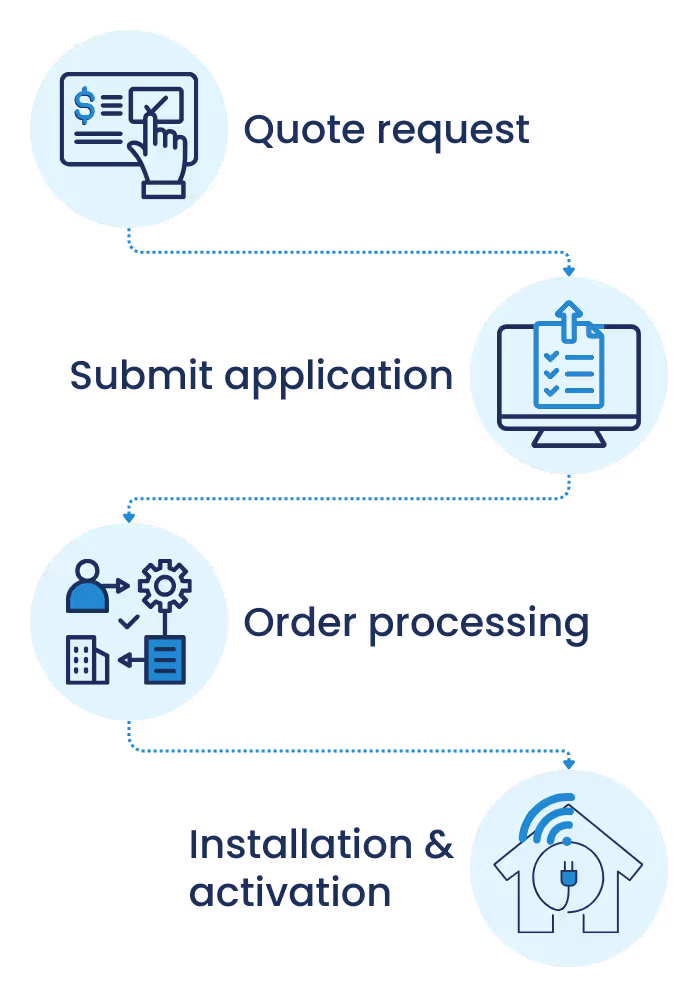

.jpg)
.jpg)
